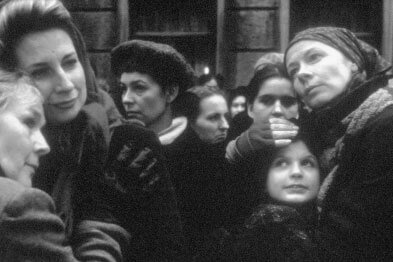Uncovering more bravery in the myriad facets of Holocaust history
As time slips away from the Second World War and into the 21st century, Nazi atrocities and their impact on the human victims continue to inspire filmmakers, who find ever new episodes of human tragedy and courage particular to those horrible years but pertinent to the ages.
Margarethe von Trotta’s new film, “Rosenstrasse,” explores the lives of Gentile women who protested the brutal deportations of their husbands during eight extraordinary days in 1943 as the Allies bombed Berlin.
Nazi Germany was a highly ordered state whose laws concerning mixed marriages were strictly enforced. Although these couples suffered under anti-Semitic rules that dictated they had to live in certain places, and had to give up “luxuries” like movies and books and records, the mixed blood in their family unit still afforded them a modicum of legal protection—at least until the period covered by this film.
After ascertaining their husbands’ whereabouts, the women started showing up in front of the detention site, the Jewish community center at 2-4 Rosenstrasse, but were only able to confirm a husband’s presence if the police returned house keys or ration books.
“Rosenstrasse” opens in New York, years after the war, as 60-year-old Ruth Weinstein (Jutta Lampe) prepares her house for her husband’s shiva. Her daughter Hannah (Maria Schrader) is perplexed by her mother’s sudden religious observance. One shiva visitor turns out to be Ruth’s first cousin, and from her Hannah discovers that a Gentile woman, Lena Fischer (Doris Schade), hid her mother following the 1943 deportation of Ruth’s mother.
“You’re my mother. I should know everything about you,” Hannah says, but Ruth won’t budge. Consequently, Hannah puts her own upcoming marriage on hold and goes to Berlin, posing as a researcher. Incredibly, she finds the 90-year-old Fischer still alive and eager to tell Hannah the story of how she came to care for Ruth while protesting the detention of her own Jewish husband Fabian (Martin Feifel).
The historical facts behind this fictional story are particularly powerful, and von Trotta renders them beautifully. Every performance here is wonderful. Each day of the Rosenstrasse protest, the women come to the detention center and stand patiently for hours, the crowds growing daily. Usually they just stare at the guards, hoping for a glimpse of their husbands in a third-story window. Despite British bombs falling and Gestapo rifles aimed at them, and fired above their heads, these women keep showing up, an inspiring act of civil disobedience.
The film’s strongest characters are the women, and the relationships among them are finely wrought. In 1943, we see Lena as a young woman (Katja Riemann) caring for young Ruth (Svea Lohde), as well as supporting her fellow protesters. The connection Hannah establishes with Lena years after the war helps her restore her relationship with her mother when she returns to New York. Hannah had planned to marry a Nicaraguan man and her experience in Berlin makes her better understand the reservations Ruth had earlier expressed about the mixed marriage.
The Holocaust has been much chronicled; the responsibility of new cinematic treatments is to lay out not just the facts or even the horror, but also their meaning in our own lives. Genocide still happens, from ethnic massacres in Rwanda, Bosnia and Kosovo to the religious and racial cleansing scarring the Sudan today. Von Trotta succeeds in speaking to the Holocaust’s contemporary significance, pairing the lone wail of the deportee being trucked off to Auschwitz with the silent pensiveness of Hannah on the subway in modern Berlin, rendered as a marriage of the old and new, where prewar dark alleys intersect the magnificent modern architecture. Von Trotta weaves the flashbacks and the current stories in such a way that they become inseparable. When we see Fabian and Lena separated by just a pane of glass in 1943, it’s like it’s happening now, proving that human dignity is not confined to a place and time.
“Rosenstrasse” proves once again that revisiting the Holocaust is not just writing more history, but as importantly measuring whether or not humanity has prevailed over some of its darker inclinations.


































